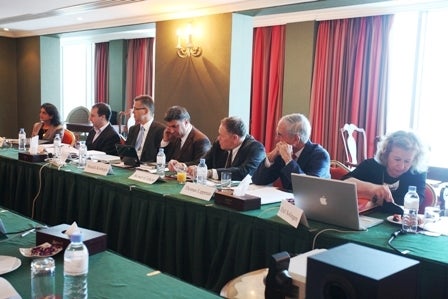Environmental Studies, Focused Discussions, Regional Studies
The Nuclear Question in the Middle East Working Group I

On May 23–24, 2010, a two-day working group meeting in Doha, Qatar took place, CIRS invited a group of scholars to discuss the “Nuclear Question in the Middle East.” The presentations took several different approaches ranging from theoretical deliberations, to practical implications, to historical narratives. During the course of the meeting, the scholars noted that it was important to define the terms in use, including the difference between nuclear exploration, nuclear acquisition, and nuclear energy options, as there are fundamental differences between these various programs. Although alluding to the constant overshadowing threat of a weapons program, civilian nuclear energy programs do not directly imply such a drastic development.
After giving situational and historical analysis, the scholars analyzed past, current, and future concerns regarding countries that have, or seek to acquire, nuclear capabilities. The participants talked about macro decision-making in relation to securitization across borders, and also analyzed how the individual characteristics of a state’s leader can influence a country’s abstinence from, or embracing of, a nuclear weapons program. As such, they relayed a direct correlation between domestic politics and the decision to go nuclear. In relation to regional politics, GCC states face a nuclear opponent in Iran and so may acquire nuclear capabilities as a direct response to this threat. Apart from the issue of securitization, the GCC states, although rich in hydrocarbons, have presented a strong case for why there is need for nuclear energy infrastructures as a means of engaging the global economy. The petrochemical industry in the Gulf is an intensively high-energy one that needs sources other than hydrocarbon, and these countries have the capacity and capital costs for making this happen
Among other issues discussed during the meeting were matters related to global security, regional mistrust, the prestige of gaining nuclear capabilities, and the role of NGOs and civil society groups in pressuring governments to abstain from nuclear energy initiatives. The scholars compared the domestic politics and the international relations for nuclear weapons acquisition. The participants also questioned the extent to which a single government can control such long-term and multi-institutional projects over decades.
The format of CIRS working group research initiatives is to convene two or three working group meetings a year to complete a variety of research projects. The first meeting is an introductory and brainstorming session where the scholars discuss the parameters of the initiative, offer themes and areas of research, and deliberate original questions and problems. The scholars then take the shared information and begin writing draft research papers, which are circulated among the group prior to the second meeting. At a subsequent meeting, scholars critique each other’s papers and offer possible alternatives for research. Towards the conclusion of the project, the papers are refined and then collected into an edited volume titled The Nuclear Question in the Middle East (Columbia University Press/Hurst, 2012).
- Click here for the working group’s agenda
- Click here for the participants’ biographies
- Read more about this research initiative
Participants and Discussants:
- Zahra Babar, CIRS, Georgetown University School of Foreign Service in Qatar
- Kai-Henrik Barth, Georgetown University School of Foreign Service in Qatar
- Kayhan Barzegar, Center for Middle East Strategic Studies; Islamic Azad University; Harvard Kennedy School’s Belfer Center for Science and International Affairs
- Alvin Chew, Gulf Research Center
- Avner Cohen, Woodrow Wilson International Center for Scholars
- John T. Crist, CIRS, Georgetown University School of Foreign Service in Qatar
- Mehran Kamrava, CIRS, Georgetown University School of Foreign Service in Qatar
- Mustafa Kibaroğlu, Bilkent University
- Thomas W. Lippman, Council on Foreign Relations and Middle East Institute
- Giacomo Luciani, Gulf Research Center Foundation
- Mari Luomi, Finnish Institute of International Affairs
- Suzi Mirgani, CIRS, Georgetown University School of Foreign Service in Qatar
- Maria Rost Rublee, University of Auckland
- Etel Solingen, University of California, Irvine
Article by Suzi Mirgani, CIRS Publications Coordinator